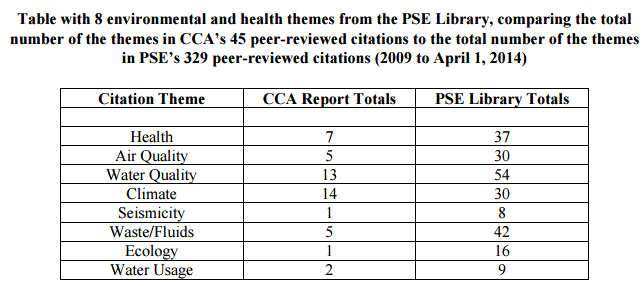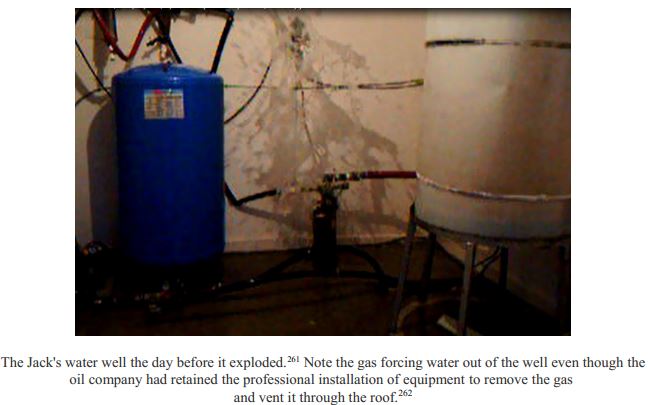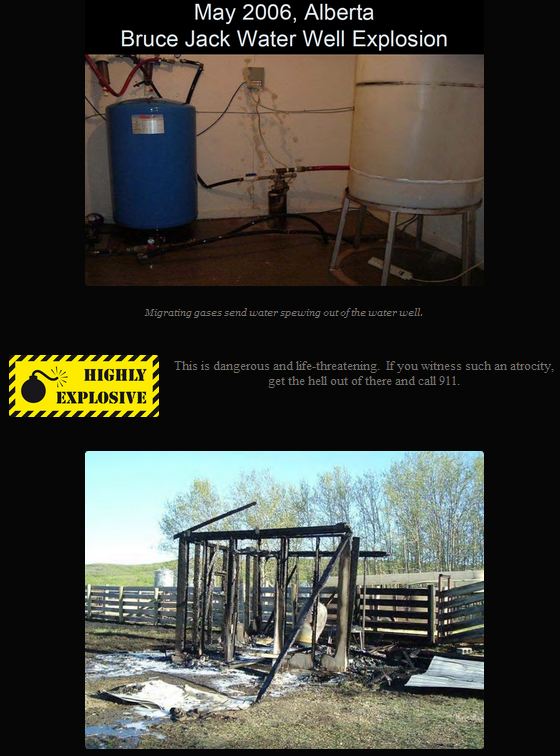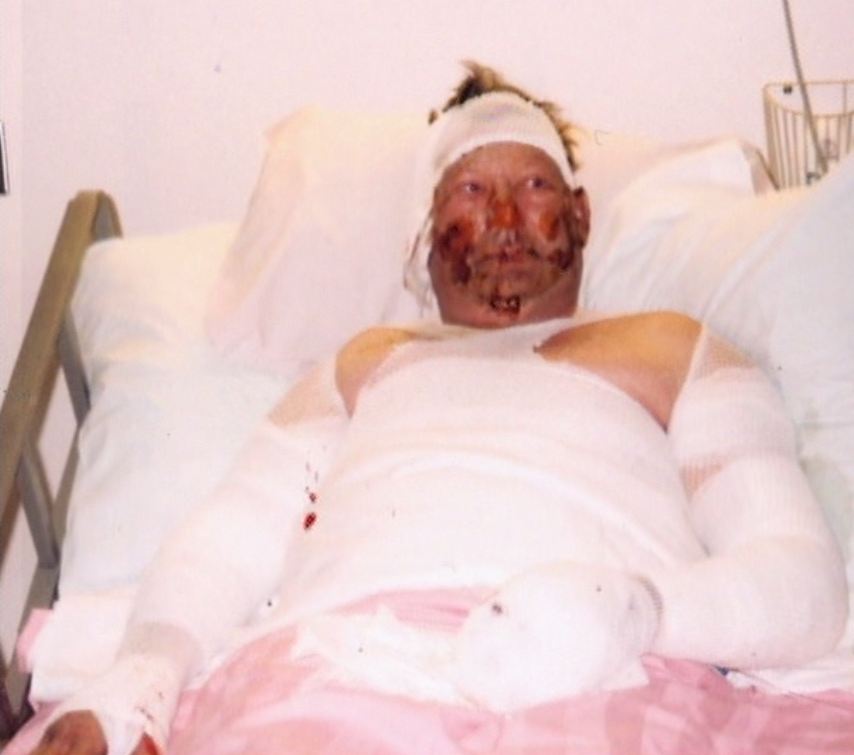Despite fracking moratorium, ‘we’re very much for energy projects’: N.B. premier by Michelle Zilio, April 12, 2015, CTVNews
Despite slapping a moratorium on fracking in New Brunswick, Premier Brian Gallant says his government is very supportive of energy projects in the province as a way to propel the economy.
Gallant told CTV’s Question Period that his Liberal government is eager to participate in energy projects like TransCanada’s Energy East pipeline project in an effort to help improve both provincial and national economy growth. “We are very much for natural resource development,” Gallant said. “We’re very much for energy projects here in the province.” Gallant’s comments come nearly two weeks after his government tabled a gloomy provincial budget, which included a projected deficit of $476.8 million.
Despite New Brunswick’s economic woes, Gallant maintained his commitment to a moratorium on hydraulic fracking until five conditions are met, including a First Nations consultation process, credible [Who defines “credible?” CAPP? Encana’s Ex VP led AER? Harper? Dr. Maurice Dusseault? Dr. John Cherry?] information about the impacts of fracking on water, health, and the environment, and a wastewater disposal plan.
“But we have to make sure that we do our due diligence. So, we’ve asked a panel to go around the province to find out what are some of the concerns of New Brunswickers when it comes to hydraulic fracturing,” said Gallant. [Emphasis added]
[How many times will the rerun be played? Who pays for it? Will it also ignore the 2012 risks and harms summarized in the May 2012 Health Canada report on fracing the way Dr. John Cherry’s Council of Canadian Academies’ 2014 expert frac panel did? ]
[Refer also to:
2015: Governments (and frac panel “experts”) addicted to ‘frack’
Jason Kenney is down in New Brunswick telling them that they can be rich like Alberta if they allow hydro-fracking.
[Rich like Prentice slashing health and education funding to ensure taxpayer money keeps flowing to the oil and gas industry?
2012: New Brunswick chief health officer Dr. Cleary warns of ‘boomtown effect’ with shale gas
2012: New Brunswick premier says reports will help decide future of shale gas industry
2012: Concerns raised over contents of shale gas report
2012: New Brunswick: Shadow continues to loom over shale gas report
2012: New Brunswick citizens demand release of health study and public consultations
2012: Doctors demand access to all health data on shale gas [Did they ever get it? Doesn’t appear so.]
Health Canada’s 2012 secret frac review admitting serious risks to health and water was completed 2 years before the Council of Canadian Academies frac panel review came out (and half a year before Eilish Cleary’s report was released) but the “experts” left out the health risks pointed out by Health Canada and did not reference them in their report. ]
…
Propaganda Experts at the New Brunswick Energy Institute?
Lalita Bharadwaj, University of Saskatchewan, Toxicology
Dr. Bharadwaj was on the Council of Canadian Academies Expert Panel on “Harnessing Science and Technology to Understand the Environmental Impacts of Shale Gas Extraction” that left out most of the damning peer-reviewed environmental and health harm studies and instead referenced a lot AER and CAPP propaganda.
Maurice Dusseault, conflict of interest frac patent holder (since 2013), University of Waterloo and senior scientific advisor to the Alberta government.
Dr. Dusseault was on the NS frac review panel; go slow and experiment Council Canadian Academies frac review panel; and to top it all off, currently on the NL frac review panel.
Bernard Goldstein, University of Pittsburgh, Public Health
Dr. Goldstein was also on the Canadian Council of Academies’ expert frac panel that left out the most damning peer-reviewed science and instead referenced AER and CAPP propaganda. Why have an American synergizer at Canadian “expert” frac tables? Because he unashamedly propagandizes and promotes fracing made safe with regulations while leaving out that regulators everywhere are madly deregulating? Doesn’t Canada have some public health experts unafraid of the truth and peer-reviewed science?
Bernard Mayer, University of Calgary, Isotope Geochemistry
Dr. Mayer was also on the CCA frac panel that left out and/or ignored the frac-caused drinking water contamination cases in Alberta and the most damning peer-reviewed science, and referenced AER and CAPP propaganda and unenforceable, voluntary promises.
Dr. John Cherry, Chair of the Council Canadian Academies’s frac review that left out the most damning regulator and industry research and data.
Does this slide look like propaganda to you? It was twice slipped into Dr. Cherry’s keynote. Why propagandize and promote fracing when presenting frac “science?”
Did the Council of Canadian Academies’ Frack Panel ‘Cherry-Pick’ the Scientific Evidence
on Harms from Fracking?
“Our examination leads me to believe that the Council of Canadian Academies’ expert frack panel ‘cherry-picked’ reports on the harms associated with hydraulic fracturing (‘fracking’). It is also apparent that many of the 428 documents cited in the CCA report on fracking were not peerreviewed, contrary to what the report claims. This is unprincipled and unconscionable stuff,” says Will Koop, Coordinator of the B.C. Tap Water Alliance. [Emphasis added]
Too little science, too much “propaganda” polarizes shale gas debate, says Canadian water expert by Mark Lowey, November 7, 2013, EnviroLine
Lack of scientific knowledge and too much “propaganda” has turned an innovative energy production technology into a polarized battle, says the head of a Canadian academic panel looking into shale gas extraction.
[Then why did Dr. Cherry’s CCA frac panel reference in their final report CAPP and AER non peer-reviewed propaganda while cherry picking to avoid proven science showing frac harms? And why present industry’s propaganda and lies in a keynote to the Munk School in May 2014? Why did the Munk School enable the presentation of industry’s lies and propaganda?]
“The basic issue is mistrust,” John Cherry, a hydrogeologist and chair of the Council of Canadian Academies (CAA) Expert Panel on Harnessing Science and Technology to Understand the Environmental Impacts of Shale Gas Extraction, said in a public talk October 28 at the University of Calgary.
There are very few experts on hydraulic fracturing technology or “fracking,” [ If you research without cherry picking and without industry’s noose around your neck, you will find many. Did the appointment and review process of the CCA frac panel intentionally avoid experts courageous enough to tell the truth?] …Cherry, distinguished professor emeritus at the University of Waterloo, told about 330 people attending the university’s Distinguished Speakers on Campus talk.
The science of shale gas development is “very immature,” and the understanding of what happens during fracking operations is “very poor,” [WHY NOT TELL THE TRUTH? There were HUNDREDS OF PEER-REVIEWED PAPERS AND DATA PROVING FRAC HARM to health and environment peer-reviewed and published before the CCA finished their review and report. And those published afterwards could be easily and economically listed annually from reference libraries publicly available on the internet] he said, stressing that he was presenting his personal views, not those of the CCA panel (http://www.scienceadvice.ca/en/assessments/in-progress/shale-gas/expert-panel.aspx).
Shale gas development is happening in Alberta and B.C. and in 35 states in the U.S., but not in Quebec or much of eastern Canada where there is public opposition due to concerns about water contamination, health impacts and climate change.
[Reality check on shale gas wells in Quebec:
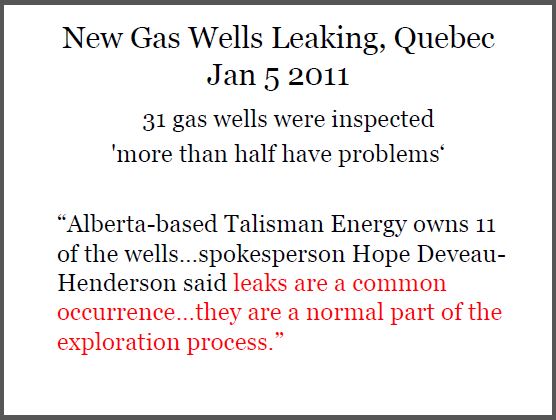 [WHY LIE?]
[WHY LIE?]
Quebec, Nova Scotia, New York State, France and other jurisdictions have put moratoriums on shale gas development until more is known about it.
… More than 175,000 oil and gas wells drilled in Alberta and B.C. since the 1950s have been stimulated using hydraulic fracturing. Yet “nobody has initiated any major research programs anywhere on the face of the Earth” on the environmental impacts of shale gas extraction, said Cherry…. [Why lie? If New York experts can find, read and post peer-reviewed, published science, why can’t CCA frac panel experts?]
“There isn’t a frac (well) pad anywhere on Earth as far as we know that has had any detailed monitoring.” [Is this true or are law violating and polluting companies and regulators refusing to make the data public?
In 2002, Dr Cherry wrote a chapter for the Council of Canadian Ministers of the Environment (CCME) – the report was recently removed from the CCME website, after being there for 14 years. His recommendations continue to be ignored by CAPP, companies, regulators and politicians. Why not tell the public that his “expert” recommendations are repeated and repeatedly ignored? Are these recommendations merely whitewashing propaganda to soothe concerned Canadians bathing their babies in poisoned water?]
The oil and gas industry, governments and other proponents of shale gas development frequently say that there has never been one documented case of fracking operations contaminating groundwater, Cherry said. But such statements amount to “propaganda” because there hasn’t been adequate monitoring done to make that claim, or to make the counter-claim that fracking definitely has contaminated groundwater used for drinking water, he said. [Why would an expert lie for industry, notably where there is ample documented evidence of fracing contaminating drinking water? Is lying and enabling lies a prerequisite to getting the Order of Canada – later stripped if the public finds out ?
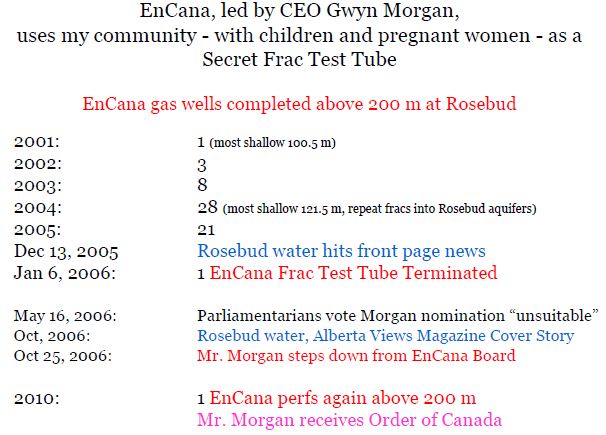
Peer-reviewed scientific studies and even petroleum industry information do indicate that leaking oil and gas wells are a “long-standing, unresolved engineering problem,” he noted, adding there’s a lot of debate about which wells leak and how much they are leaking.
[If so, why promote fracing as an amazing technology when experts know that the brute force experiment makes leaks worse?

May 2014: Slide from Dr. Cherry’s keynote to the Munk School, U of Toronto
A study by North Carolina-based Duke University found that homeowners living within one kilometre of gas wells have drinking water contaminated by “stray gas,” although it’s not known if fracking was responsible, Cherry said.
Duke University scientists found that 82 per cent of the 141 water wells they tested in Pennsylvania above the Marcellus Shale rock formation had elevated levels of methane, the main component of natural gas…. Water wells nearer to gas-drilling sites had the highest levels of methane, according to the study, published online in June 2013 by the Proceedings of the National Academy of Scientists.
… Cherry told his Calgary audience that the real question is not whether methane – which can also occur naturally in groundwater – has contaminated water wells, but whether this contamination is causing harmful effects. [Why didn’t Dr. Cherry do a bit of research and ask Bruce Jack?
May 2006: Bruce Jack in hospital after his industry-caused methane and ethane contaminated drinking water exploded. Bruce and two industry gas-in-water testers were seriously injured during testing of the contaminated water. This information (and much more on fracing caused drinking water pollution and explosions) was sent to the CCA frac panel long before the ‘experts’ completed their review. Why ignore it?
However, there is “hardly any science” that would enable us to predict what fracked gas wells will do to groundwater wells or freshwater aquifers, he said.
[REALITY CHECKS:
2013:
The Science is Deafening
Industry’s Contamination Everywhere
Regulator and Protective Agencies Run for Cover
2015:
“Our examination leads me to believe that the Council of Canadian Academies’ expert frack panel ‘cherry-picked’ reports on the harms associated with hydraulic fracturing (‘fracking’). It is also apparent that many of the 428 documents cited in the CCA report on fracking were not peerreviewed, contrary to what the report claims. This is unprincipled and unconscionable stuff,” says Will Koop, Coordinator of the B.C. Tap Water Alliance.
“PROPER” MONITORING NEEDED
Richard Jackson, a professor at the University of Waterloo and principal with Geofirma Engineering, says a “proper” groundwater monitoring system in New Brunswick would cost multimillions of dollars and the federal government should invest in it. (See http://uwaterloo.ca/news/blog/post/shale-gas-expert-calls-safety-system). Jackson, speaking in August 2013 to the New Brunswick Energy Institute’s roundtable on shale gas, said the best way to gauge the effects of shale gas extraction is to set up a system that would monitor what’s happening to aquifers deep underground where drilling has happened in the past. [Ensures data collected after the fact will NOT BE “BASELINE,” Protects polluters and enabling regulators and shoulders the public with the billions or millions in liablities ]
This would provide the baseline for scientists to know how polluted the aquifers already are and whether anything changes with more drilling, Jackson said. [ But instead of admitting publicly that the oil and gas industry contaminated drinking water historically, industry and its captured regulators and politicians conveniently blame nature.]
Cherry said in Calgary that many countries in the world have enormous shale gas deposits and the comparatively clean-burning natural gas [Peer reviewed papers have proven that frac’d gas is not clean and dramatically increases emissions] could be used, along with nuclear power, to replace coal and reduce greenhouse gas emissions.
… But industry and government [and their controlled, propagandizing “experts”] have created mistrust in the public about shale gas development by not disclosing the chemicals used in fracking, and by “overpromising on science and technology,” Cherry said.
Lack of research and transparency has left industry and government vulnerable to questions for which there are not answers, he said, including “all sorts of questions about the fracking chemicals for which answers aren’t available.”
[REALITY CHECK: CHERRY PICK RESEARCH TO MAKE IT APPEAR NON-EXISTENT?
Multidisciplinary research is “urgently needed,” he said, adding it will take more science to understand shale gas development and for governments to manage it properly.
After his talk, one audience member asked Cherry if it was realistic to expect oil and gas companies to publicly reveal their fracking formulae or geological information and possibly put them at a competitive disadvantage. Cherry responded that the academic community feels there must be much more transparency. The decision whether or not to publicly disclose fracking chemicals depends on how much social license to operate the industry wants to ‘buy,’ or “how much . . . you want to piss people off,” he added.
British Columbia and Alberta are using a website called FracFocus (http://fracfocus.org/) to show fluids on a well-by-well basis. This public disclosure doesn’t include chemicals that can be kept proprietary as a “trade secret.” [and was mandated decades too late, helps none of the families already poisoned]
The 16-member Canadian Council of Academies panel is expected to release its report in early 2014.
The University of Calgary in September this year released a new energy research strategy, Energy Innovations for Today and Tomorrow (http://www.ucalgary.ca/news/files/news/Energy_Strategy.pdf).
The strategy identifies “Unconventional hydrocarbon resources” and “Hydraulic fracturing” as two of four “grand challenges” for targeted research that will draw on disciplinary and interdisciplinary strengths at the university.
Meanwhile, at the end of October, 11 companies that perform hydraulic fracturing in Canada announced they’d signed a new [VOLUNTARY, UNINSPECTED, UNENFORCEABLE] “code of conduct” that outlines standard practices for technical and environmental performance, as well as guidelines companies should [ESCAPE HATCH WORD] follow when dealing with [TRANSLATION: LYING TO?] community groups and other stakeholders.
The new code, developed by the Petroleum Services Association of Canada in consultation with stakeholders, also commits companies to developing technologies for reducing water usage, disclosing the fluid types used in the fracking process, responding quickly to community concerns, and establishing clear and effective health and safety policies, according to a story by Amanda Stephenson in the Calgary Herald (see http://www.calgaryherald.com/business/energy-resources/Fracking+companies+calm+public+fears+with+code/9103624/story.html?__lsa=39a6-f62b).
Brad Fedora, president and CEO of Canyon Services Group, said most of the guidelines in the new code are already standard industry practice.
Fracking operations are more strictly regulated in Canada than most other jurisdictions, Federo said, adding: “What may be reported in the media in parts of the U.S. may not apply here.” [IF FRACING IS SO AMAZING AND SAFE, WHY LIE SO MUCH?]
… Meanwhile, Halliburton Canada has developed a fracking fluid, called CleanStim, that consists of ingredients sourced entirely from the food industry… (see http://www2.canada.com/calgaryherald/news/calgarybusiness/story.html?id=11602274-1e84-44c2-a2e1-444b8a903513). Other companies are also developing fracking chemicals that are either non-toxic or food-grade. [Developing does not mean such fluids are used. Companies are only interested in always reducing costs, not increasing them. Emphasis added]


